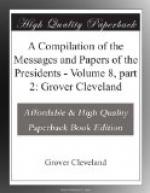or in any manner to enforce the laws. This is
altogether foreign to the purpose of an Army appropriation
bill. The practice of tacking to appropriation
bills measures not pertinent to such bills did not
prevail until more than forty years after the adoption
of the Constitution. It has become a common practice.
All parties when in power have adopted it. Many
abuses and great waste of public money have in this
way crept into appropriation bills. The public
opinion of the country is against it. The States
which have recently adopted constitutions have generally
provided a remedy for the evil by enacting that no
law shall contain more than one subject, which shall
be plainly expressed in its title. The constitutions
of more than half of the States contain substantially
this provision. The public welfare will be promoted
in many ways by a return to the early practice of
the Government and to the true principle of legislation,
which requires that every measure shall stand or fall
according to its own merits. If it were understood
that to attach to an appropriation bill a measure irrelevant
to the general object of the bill would imperil and
probably prevent its final passage and approval, a
valuable reform in the parliamentary practice of Congress
would be accomplished. The best justification
that has been offered for attaching irrelevant riders
to appropriation bills is that it is done for convenience
sake, to facilitate the passage of measures which
are deemed expedient by all the branches of Government
which participate in legislation. It can not be
claimed that there is any such reason for attaching
this amendment of the election laws to the Army appropriation
bill. The history of the measure contradicts
this assumption. A majority of the House of Representatives
in the last Congress was in favor of section 6 of this
bill. It was known that a majority of the Senate
was opposed to it, and that as a separate measure
it could not be adopted. It was attached to the
Army appropriation bill to compel the Senate to assent
to it. It was plainly announced to the Senate
that the Army appropriation bill would not be allowed
to pass unless the proposed amendments of the election
laws were adopted with it. The Senate refused
to assent to the bill on account of this irrelevant
section. Congress thereupon adjourned without
passing an appropriation bill for the Army, and the
present extra session of the Forty-sixth Congress
became necessary to furnish the means to carry on the
Government.
The ground upon which the action of the House of Representatives is defended has been distinctly stated by many of its advocates. A week before the close of the last session of Congress the doctrine in question was stated by one of its ablest defenders as follows:




